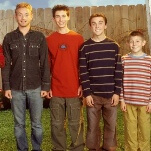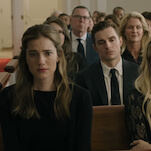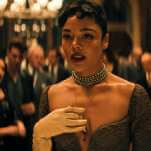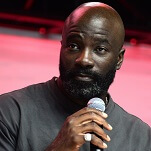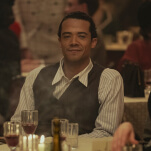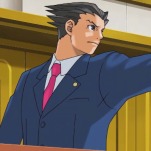After giving Lights and company some minor victories at the midseason point and after letting it seem as though all of this might really work out, Lights Out plunges everybody back into desperation again tonight and even deeper than they were before. Of course, we knew this would have to happen—that wound Lights sustained at the end of the last episode was only the most obvious, most external example of things ratcheting up another notch or two—because this is a television show and there are four episodes left and so on and so forth, but I was really impressed with the way the show made things more troublesome for our hero so quickly. He’s got two months to get ready for the fight, over the course of this episode, but he’s also got a serious wound that needs time to mend. And at the same time, Barry and Death Row are maneuvering, and he can sense that big payday that would make everything OK slipping from his fingers.
I have this friend who takes everything he watches with a male hero and tries to make it a tract about the diminishing role of masculinity in American society. It’s kind of irritating, honestly, but I think he’d have a field day with Lights Out, which is gradually revealing itself as a show about a good man who rejects all of the other good ideas he has because they don’t involve him saving the day. I’m not trying to say Lights has a hero complex or anything, but he’s a guy who rejects some of the perfectly sensible ideas arrived at by the people around him because the only way he knows how to make things better is by fighting in the ring. He’s a guy who seems unable to face assorted realities, a guy who presses forward when he should be stepping back, simply because that’s all he knows how to do.
And the show presents this as a good thing! Honestly, I’ve been reading it as a good thing all this time. This is who Lights is. This is what he does. Here he is taking control of his destiny. Part of it stems from the fact that most American narrative is based on an underdog who makes good in some way, and Lights Out fits very easily into those conventions. Watching Lights fight back for his dignity and try to retake his title is very much that story of the man who was once great and now wants to re-attain that greatness. But as I watched “Cut Men,” with its lengthy scenes of Theresa considering her own future and compromising to make more money, the better to help the family out, the more I realized that there are other ways to do this, that the Leary family doesn’t NEED Lights to get back in the ring anymore. The Morales payout seems to have bought them enough time that Theresa could compromise what she wants and start making enough money to support the family on her own. Granted, she’d be giving up on her dreams, but part of being an adult is knowing when to do that.
I’m not saying that Lights’ impulse to keep fighting is wrong. Lord knows I wouldn’t want my wife to give up on something she really wanted because of something I thought I could fix easily enough. But the more I think about it, the more I think Theresa’s solution makes sense and doesn’t involve Lights endangering his health or his mental well-being or his reputation or his pocketbook. It also doesn’t mean that he has to get in bed with Brennan to buy him the time he needs to get ready, and it also doesn’t mean that he has to track down Death Row at a fancy meal to berate him about ducking Lights in favor of a Ukrainian up and comer. (The scene where the two start pummeling each other on the street corner is a truly arresting one, and I love the way the next act opens with Daniella’s simultaneously horrified, amused, and intrigued face.) Just like in the pilot, we’ve been long conned. This is a show about a guy who fights, and while that’s the engine of the show, it’s also something the series has to grapple with. It literally cannot explore what happens if its protagonist ceases to fight because then he’d cease to exist (as would the show). What we’re seeing now is like that lengthy series of quick cuts at the end of the pilot, where Lights beat the shit out of everyone from earlier in the episode. Only now, he’s mostly doing it to himself.
Let’s be honest: That cut in Lights’ side doesn’t look good, and his insistence on continuing his training regimen seems to make it even worse. The circumstances behind the cut—amusingly depicted in tonight’s “previously on” in a way that would imply that Lights somehow had super-hearing to anyone who hadn’t seen last week’s episode—are still a little bizarre, and it’s still too bad that Ed’s gone for the foreseeable. (Lights and his people have blamed the cut on a crazy homeless man, a story that doesn’t hold up for any journalist who holds it to any level of scrutiny.) But the aftermath of that cut, the way that it forces Lights to really consider just how much HE wants this rematch and not how much circumstances are forcing him into the rematch, is all pretty good. Granted, Barry plays Lights, pushing him further into that corner Barry keeps putting him in, but Lights COULD refuse to play. “Cut Men” is the first episode to present him with actual options in the realm of NOT fighting.
And for as much as I love the way that Barry plays Lights like a piano or the way that Death Row tries to abstain or the way that Lights forces the issue himself, I also love shows that play with their audience, by trying to get us to want something that’s not terribly a good idea for the protagonist. We want to see Lights and Death Row fight because that’s our big, exciting climax (and I expect it to be tremendous). But the show is also showing us in these last few episodes that it really might be better all around if Lights and his family figured out a different way to go forward. In most stories, making a deal with the devil doesn’t involve desperate straits, straits that would be impossible to escape without supernatural intervention. In most stories, the devil plays on our own vanity and tricks us into exactly the position he wants us in. And that’s exactly where Barry and Brennan—who are in cahoots, remember—have placed Lights. He’s a man who has every chance to say no, but he keeps saying yes. And when he shakes Brennan’s hand at the end, he’s sealing his own fate.
Stray observations:
- I don’t think I’d be so amused by the fact that the show keeps writing out cast members if it didn’t keep calling attention to it. I wouldn’t have noticed Ava and Pops weren’t there this week if the show hadn’t kept saying, “Oh, they’re not there!” Both didn’t have a terribly compelling story reason to be there (well, Ava probably wouldn’t have missed her mom’s graduation if she was in town), so I didn’t miss them until I was told to miss them. Something the show could probably fix in a mythical season two.
- Brennan dating Margaret is an interesting twist, and I like how the show depicted them as genuinely enjoying each other’s company, rather than suggesting this is just the latest way for Brennan to get under Lights’ skin, even if Lights saw it that way.
- Maybe I’m nuts, but this is the first week I sort of saw what Johnny brings to the table as Lights’ manager. That scene where he handles the story about Death Row pursuing a fight with someone other than Lights was well done.
- On the other hand, I don’t really feel like the show has done a terribly good job of explaining Johnny’s relationship with his ex-wife and son. It feels very generic, on a show that thrives on specificity. Another thing that could be improved in the second season we almost certainly won’t get.
- And along those lines, I thought this article from Jaime Weinman, about the changing standards of cable TV, ratings-wise, was a good read.











